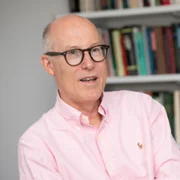State capacity: crafting effective development strategies

[Professor Besley was asked to chair the review panel on the basis of] his track record in applied economics, his understanding of the multilateral development banks, and especially his research record and proven expertise with respect to the topic of state capacity in a market economy.
What was the problem?
Some two billion people live in countries affected by fragility and conflict. The problem of state fragility is widely viewed as one of most intractable challenges in development, and has become an increasingly urgent focus for multilateral institutions and donors. This reflects (in part) the centrality of state fragility to the UN’s Sustainable Development Goal 16, which calls for peaceful, inclusive, and just societies.
However, without a framework for understanding what is necessary for a state to have capacity to operate, namely to enforce the law and raise revenue, and what is distinctive about fragile states, it is difficult to deliver an effective strategy for tackling their problems and improving the lives of the people affected.
These five questions are key to building a theory of state fragility, and then addressing the problem:
- What role does state capacity play in building effective government?
- What forces shape incentives to build state capacity?
- How does building state capacity support markets?
- What role does investing in state capacity play in establishing security and reducing conflict? How does capacity build resilience to shocks?
What did we do?
Professor Tim Besley has published extensively on the role and origins of state capacity. To understand the multiple dimensions underpinning the development process, Besley and co-author Professor Torsten Persson (Centennial Professor, LSE) started by exploring the differences in countries’ experiences of building state capacity. In their subsequent monograph, state capacity is envisaged as the ability of the state to support markets and enforce contracts (legal capacity) and to raise revenue (fiscal capacity). This theory brings together investment in state institutions, political violence, and economic growth.
One key insight of their work is that state revenue can either be directed to broad-based or narrowly targeted programmes. In the absence of institutional constraints on the executive, politicians tend to allocate more resources to their own "in-group" – for example, selective investment in locations populated by their supporters – to the detriment of programmes benefiting everyone, such as national healthcare. Less cohesive institutions allow the state to be run in the interests of a narrow group, entrenching social cleavages; this weakens motivations to improve the core functions of revenue collection and market support. When institutions are not cohesive, political instability shortens the time horizons of governments and diminishes incentives to invest in the state.
It has long been observed that civil wars tend to arise in low-income countries with weak executive constraints. Drawing on their conceptual framework, Besley and Persson consider incentives for political violence. States with cohesive institutions typically make little use of political violence. Where institutions are not cohesive, governments use political violence to maintain power. This can result in stable repressive states which have some incentives for building state capacity. However, when it leads to contested power and civil war, this is not conducive to state capacity-building.
This framework can provide a wider understanding of what makes states effective in maintaining social order and delivering their core functions. State fragility is a multidimensional symptom of underdevelopment, characterised as the clustering of weak state capacity, low income, and political violence. In an ineffective state, few investments are made in fiscal and legal capacity; in a violent state, the government and opposition invest in violence to maintain or acquire political power. A common interest in providing public goods, fostered either by circumstances or cohesive political institutions, can eliminate both of these problems. However, when institutions are non-cohesive, either pathology may emerge. In highlighting the multidimensionality of under-development, the research avoids excessive emphasis on income and brings a focus on state ineffectiveness and political violence as aspects of development.
In an effort to use this research to inform effective approaches to development, the LSE-Oxford Commission on State Fragility, Growth and Development was established in 2017 under the academic direction of Besley with Professor Paul Collier (Oxford). The Commission’s report, "Escaping the Fragility Trap" (2018), provided recommendations to address state fragility, underpinned by Besley and Persson’s analysis. A key insight of the Commission’s work is that state fragility remains because there are vested interests in maintaining the status quo. Without addressing these incentive problems, it is impossible to understand how progress can be made.
What happened?
Besley’s research has made a significant contribution to improving the understanding of state fragility in the international policy debate, including through the work of the Commission. Chaired by former UK Prime Minister David Cameron, the Commission has developed partnerships between practitioners and researchers, and includes a mix of academics, private sector actors, and individuals with policymaking experience.
Key findings of the Commission’s report were discussed at a roundtable on state fragility and development hosted by the IMF in 2018. The report is also credited with having focused renewed attention on the issue of state fragility in the 2019 final report of the "Bellagio Consensus". This initiative, co-sponsored by the United States Institute of Peace, aimed to find "a critical path forward on the future of fragile states".
The Commission has also supported the work of governments and international organisations helping fragile states to change policy practices. One of its recommendations was that: "[development finance institutions] and aid agencies should coordinate their financial and technical support for sectors prioritised as strategic". In response, in 2019, the Development Finance Institutions Fragility Forum was established, bringing together 27 financial institutions to discuss how to improve the effectiveness of job-creating private investment in fragile and conflict-affected environments. Participants agreed on a series of potentially transformational pilot programmes, trialling a collaborative approach to their investments.
The analytical framework developed by Besley and Persson has also supported the development of evidence-based policy strategies of major development agencies, including the European Bank for Reconstruction and Development (EBRD). This multilateral development bank was established in 1991 to provide financial support to the former Eastern Bloc countries and support their transition to an open, market-oriented economy. It now invests some €10 billion each year in 38 economies in post-communist countries, the Middle East, and North Africa. In 2015, the EBRD commissioned an external review of its central criteria of transition to a market economy. The review panel was chaired by Besley, and its revised transition concept, which was adopted by the EBRD, challenged the bank’s deeply held views about what constitutes a market economy. It emphasised instead that a well-functioning, sustainable market economy should be well-governed, resilient, inclusive, environmentally friendly, and integrated, as well as competitive. Following the review, the EBRD focused its work more on outcomes, including through a new impact assessment framework project. As such, the revised transition concept informed by LSE research has had knock-on effects on the Bank’s operations, evaluations, and strategic approach.


